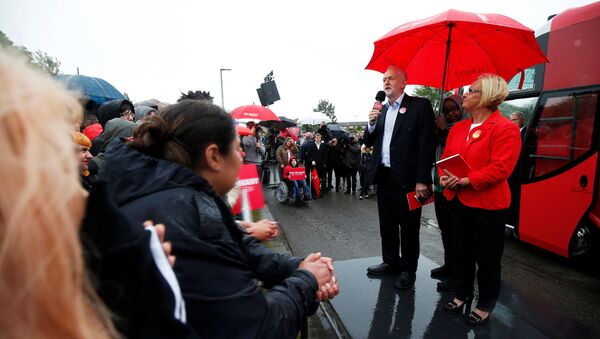LONDON (Sputnik) — While at the start of the presidential campaign the Conservative Party was well on the rise, hoping to further extend its hold of Westminster, the recent YouGov poll showed that the Tories might receive 305 seats in the parliament with 42 percent of votes in the upcoming general election, which is 21 seats less than the required majority.
"We had huge leads earlier in the campaign, which were completely unprecedented. To expect that to be sustained is unrealistic. If you look at the actual polls, there has not been a single poll in which Labour has been ahead. In 2015, half polls had Labours ahead, and Conservatives still won. So we are talking about relative performance, and it's very easy to forget that. So I think this Labour surge has been exaggerated… They just started with very low expectations," Kwarteng, whose membership in the parliament was suspended for the duration of the election, said.
The Spelthorne candidate pointed out that the lead of the Conservatives was also exaggerated, adding that there was no way that the party could have been ahead for 24 points.
"I think there was a lot of euphoria, our lead was exaggerated as well. But now I hope it's being on its place. I hope and expect that we will have a reasonable lead on the Election Day itself," he said.
Despite the sliding popularity of the party, Kwarteng did not consider that decision of UK Prime Minister Theresa May to call a snap election was a mistake, adding that it was right for her "to decide to have a full parliament with which Brexit could take place."
"One thing that has not happened and that people thought would happen was the Libdem surge. Everyone thought at the beginning of this process that the Libdems would win maybe 20 seats. But as the campaign was going on, they haven't really had any kind of traction. The percentage is polls in unimpressive," Kwarteng added.
The Tories candidate expressed hope for the party to increase the majority, stressing that it would be a disappointment "to end up with a fewer seats than at the beginning of the process."
On April 18, UK Prime Minister Theresa May announced her decision to hold an early parliamentary election on June 8 to overcome divisions in the parliament and succeed in the negotiations with the European Union on Brexit.

